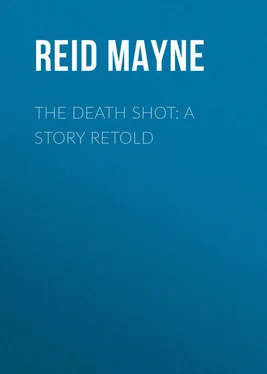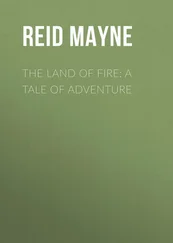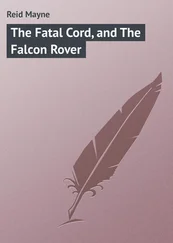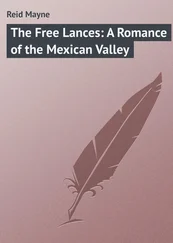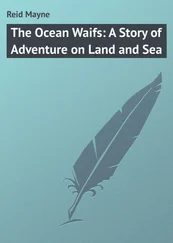Mayne Reid - The Death Shot - A Story Retold
Здесь есть возможность читать онлайн «Mayne Reid - The Death Shot - A Story Retold» — ознакомительный отрывок электронной книги совершенно бесплатно, а после прочтения отрывка купить полную версию. В некоторых случаях можно слушать аудио, скачать через торрент в формате fb2 и присутствует краткое содержание. Жанр: literature_19, foreign_antique, foreign_prose, на английском языке. Описание произведения, (предисловие) а так же отзывы посетителей доступны на портале библиотеки ЛибКат.
- Название:The Death Shot: A Story Retold
- Автор:
- Жанр:
- Год:неизвестен
- ISBN:нет данных
- Рейтинг книги:3 / 5. Голосов: 1
-
Избранное:Добавить в избранное
- Отзывы:
-
Ваша оценка:
- 60
- 1
- 2
- 3
- 4
- 5
The Death Shot: A Story Retold: краткое содержание, описание и аннотация
Предлагаем к чтению аннотацию, описание, краткое содержание или предисловие (зависит от того, что написал сам автор книги «The Death Shot: A Story Retold»). Если вы не нашли необходимую информацию о книге — напишите в комментариях, мы постараемся отыскать её.
The Death Shot: A Story Retold — читать онлайн ознакомительный отрывок
Ниже представлен текст книги, разбитый по страницам. Система сохранения места последней прочитанной страницы, позволяет с удобством читать онлайн бесплатно книгу «The Death Shot: A Story Retold», без необходимости каждый раз заново искать на чём Вы остановились. Поставьте закладку, и сможете в любой момент перейти на страницу, на которой закончили чтение.
Интервал:
Закладка:
His re-appearance so early, unexpected; his empty gamebag; the coon-dog carried under his arm; all have their effect upon Phoebe. She cannot help feeling surprise, accompanied by a keen curiosity.
She is not the woman to submit to it in silence.
Confronting her dark-skinned lord and master, with arms set akimbo, she says, —
“Bress de Lor’, Bill! Wha’ for you so soon home? Neider coon nor possum! An’ de dog toated arter dat trange fashun! You ain’t been gone more’n a hour! Who’d speck see you come back dat a way, empty-handed; nuffin, ’cep your own ole dog! ’Splain it, sah?”
Thus confronted, the coon-hunter lets fall his canine companion; which drops with a dump upon the floor. Then seats himself on a stool, but without entering upon the demanded explanation. He only says: —
“Nebba mind, Phoebe, gal; nebba you mind why I’se got home so soon. Dat’s nuffin ’trange. I seed de night warn’t a gwine to be fav’ble fo’ trackin’ de coon; so dis nigga konklood he’d leab ole cooney ’lone.”
“Lookee hya, Bill!” rejoins the sable spouse, laying her hand upon his shoulder, and gazing earnestly into his eyes. “Dat ere ain’t de correck explicashun. You’s not tellin’ me de troof!”
The coon-hunter quails under the searching glance, as if in reality a criminal; but still holds back the demanded explanation. He is at a loss what to say.
“Da’s somethin’ mysteerus ’bout dis,” continues his better half. “You’se got a seecrit, nigga; I kin tell it by de glint ob yer eye. I nebba see dat look on ye, but I know you ain’t yaseff; jess as ye use deseeve me, when you war in sich a way ’bout brown Bet.”
“Wha you talkin ’bout, Phoebe? Dar’s no brown Bet in de case. I swar dar ain’t.”
“Who sayed dar war? No, Bill, dat’s all pass. I only spoked ob her ’kase ya look jess now like ye did when Bet used bamboozle ye. What I say now am dat you ain’t yaseff. Dar’s a cat in de bag, somewha; you better let her out, and confess de whole troof.”
As Phoebe makes this appeal, her glance rests inquiringly on her husband’s countenance, and keenly scrutinises the play of his features.
There is not much play to be observed. The coon-hunter is a pure-blooded African, with features immobile as those of the Sphinx. And from his colour nought can be deduced. As already said, it is the depth of its ebon blackness, producing a purplish iridescence over the epidermis, that has gained for him the sobriquet “Blue Bill.”
Unflinchingly he stands the inquisitorial glance, and for the time Phoebe is foiled.
Only until after supper, when the frugality of the meal – made so by the barren chase – has perhaps something to do in melting his heart, and relaxing his tongue. Whether this, or whatever the cause, certain it is, that before going to bed, he unburdens himself to the partner of his joys, by making full confession of what he has heard and seen by the side of the cypress swamp.
He tells her, also, of the letter picked up; which, cautiously pulling out of his pocket, he submits to her inspection.
Phoebe has once been a family servant – an indoor domestic, and handmaiden to a white mistress. This in the days of youth – the halcyon days of her girlhood, in “Ole Varginny” – before she was transported west, sold to Ephraim Darke, and by him degraded to the lot of an ordinary outdoor slave. But her original owner taught her to read, and her memory still retains a trace of this early education – sufficient for her to decipher the script put into her hands.
She first looks at the photograph; as it is the first to come out of the envelope. There can be no mistaking whose likeness it is. A lady too conspicuously beautiful to have escaped notice from the humblest slave in the settlement.
The negress spends some seconds gazing upon the portrait, as she does so remarking, —
“How bewful dat young lady!”
“You am right ’bout dat, Phoebe. She bewful as any white gal dis nigga ebber sot eyes on. And she good as bewful. I’se sorry she gwine leab dis hya place. Dar’s many a darkie ’ll miss de dear young lady. An’ won’t Mass Charl Clancy miss her too! Lor! I most forgot; maybe he no trouble ’bout her now; maybe he’s gone dead! Ef dat so, she miss him , a no mistake. She cry her eyes out.”
“You tink dar war something ’tween dem two?”
“Tink! I’se shoo ob it, Phoebe. Didn’t I see dem boaf down dar in de woodland, when I war out a-coonin. More’n once I seed em togedder. A young white lady an’ genl’m don’t meet dat way unless dar’s a feelin’ atween em, any more dan we brack folks. Besides, dis nigga know dey lub one noder – he know fo sartin. Jule, she tell Jupe; and Jupe hab trussed dat same seecret to me. Dey been in lub long time; afore Mass Charl went ’way to Texas. But de great Kurnel Armstrong, he don’t know nuffin’ ’bout it. Golly! ef he did, he shoo kill Charl Clancy; dat is, if de poor young man ain’t dead arready. Le’s hope ’tain’t so. But, Phoebe, gal, open dat letter, an’ see what de lady say. Satin it’s been wrote by her. Maybe it trow some light on dis dark subjeck.”
Phoebe, thus solicited, takes the letter from the envelope. Then spreading it out, and holding it close to the flare of the tallow dip, reads it from beginning to end.
It is a task that occupies her some considerable time; for her scholastic acquirements, not very bright at the best, have become dimmed by long disuse. For all, she succeeds in deciphering its contents and interpreting them to Bill; who listens with ears wide open and eyes in staring wonderment.
When the reading is at length finished, the two remain for some time silent, – pondering upon the strange circumstances thus revealed to them.
Blue Bill is the first to resume speech. He says: —
“Dar’s a good deal in dat letter I know’d afore, and dar’s odder points as ’pear new to me; but whether de old or de new, ’twon’t do for us folk declar a single word o’ what de young lady hab wrote in dat ere ’pistle. No, Phoebe, neery word must ’scape de lips ob eider o’ us. We muss hide de letter, an’ nebba let nob’dy know dar’s sich a dockyment in our posseshun. And dar must be nuffin’ know’d ’bout dis nigga findin’ it. Ef dat sakumstance war to leak out, I needn’t warn you what ’ud happen to me. Blue Bill ’ud catch de cowhide, – maybe de punishment ob de pump. So, Phoebe, gal, gi’e me yar word to keep dark, for de case am a dangersome, an a desprit one.”
The wife can well comprehend the husband’s caution, with the necessity of compliance; and the two retire to rest, in the midst of their black olive branches, with a mutual promise to be “mum.”
Chapter Fourteen.
Why comes he not?
Helen Armstrong goes to bed, with spiteful thoughts about Charles Clancy. So rancorous she cannot sleep, but turns distractedly on her couch, from time to time changing cheek upon the pillow.
At little more than a mile’s distance from this chamber of unrest, another woman is also awake, thinking of the same man – not spitefully, but anxiously. It is his mother.
As already said, the road running north from Natchez leads past Colonel Armstrong’s gate. A traveller, going in the opposite direction – that is towards the city – on clearing the skirts of the plantation, would see, near the road side, a dwelling of very different kind; of humble unpretentious aspect, compared with the grand mansion of the planter. It would be called a cottage, were this name known in the State of Mississippi – which it is not. Still it is not a log-cabin; but a “frame-house,” its walls of “weather-boarding,” planed and painted, its roof cedar-shingled; a style of architecture occasionally seen in the Southern States, though not so frequently as in the Northern – inhabited by men in moderate circumstances, poorer than planters, but richer, or more gentle, than the “white trash,” who live in log-cabins.
Читать дальшеИнтервал:
Закладка:
Похожие книги на «The Death Shot: A Story Retold»
Представляем Вашему вниманию похожие книги на «The Death Shot: A Story Retold» списком для выбора. Мы отобрали схожую по названию и смыслу литературу в надежде предоставить читателям больше вариантов отыскать новые, интересные, ещё непрочитанные произведения.
Обсуждение, отзывы о книге «The Death Shot: A Story Retold» и просто собственные мнения читателей. Оставьте ваши комментарии, напишите, что Вы думаете о произведении, его смысле или главных героях. Укажите что конкретно понравилось, а что нет, и почему Вы так считаете.
